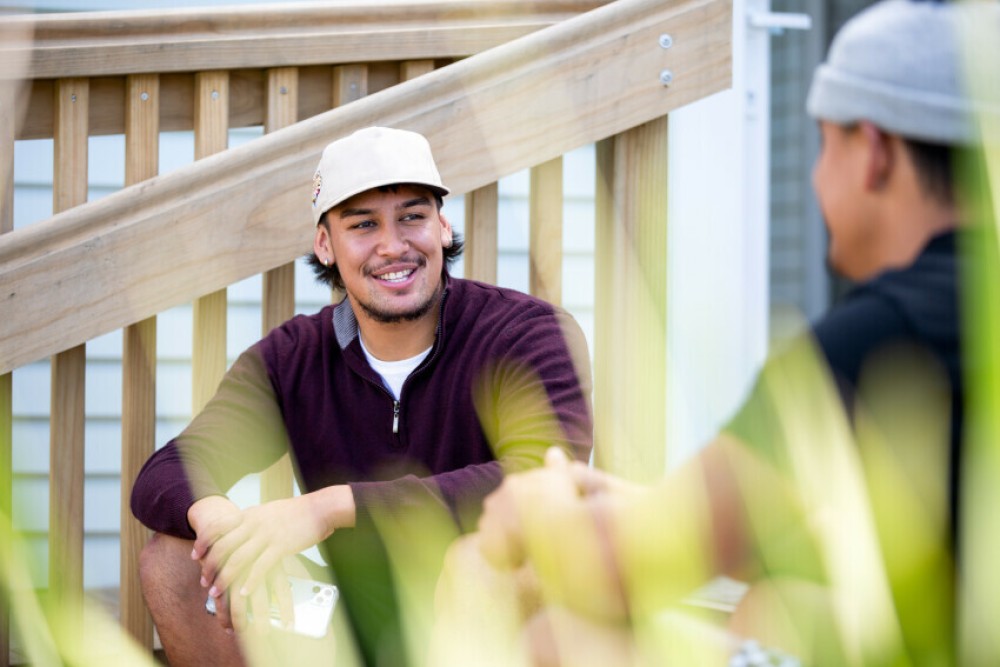-small.jpg)
Knowing how to support a whānau member, friend or colleague who has lost someone to suspected suicide can feel daunting. You might worry about saying the wrong thing or not know what to say at all. That’s okay. Showing up with compassion, patience and aroha can make all the difference.
Grief after a suspected suicide can be especially isolating. Many bereaved people report receiving less support than those grieving other types of loss. This may be due to stigma, uncertainty, or discomfort around the topic of suicide. That’s why your gentle, proactive manaaki/care and support is so crucial. The grieving person may not have the energy or words to reach out, so reach in.
If you’re supporting a staff member returning to work after a suicide bereavement, check page 32 and 33 of A guide for workplaces: Supporting your staff and organisation after a suspected suicide resource.
"Though you can’t take away the pain, your steady support can help someone feel less alone in their grief." - Anonymous
Simple and meaningful ways to support someone
Here is a list of some ways you can tautoko/support the bereaved person:
- Let them know you’re there, and that it’s okay if they don’t want to talk.
- Be patient, because grief takes time and looks different for everyone.
- Try to listen to them without trying to “fix” their grief.
- Offer comfort, not solutions. It's okay to say the person’s name.
- Acknowledge what they’re feeling by saying “That sounds really hard”, or “It’s okay to feel that way.”
- Let them repeat stories about or memories of the person who died, as this can help them process what happened.
- Choose a card with space inside and write a personal story or memory of the person you’d like to honour and share.
- If there are tamariki/children or rangatahi/young people in the whānau, acknowledge their grief too.
- Remind them gently that grief has no timeline, and they don’t need to ‘get over’ it.
- Stay in touch – not just now, but in the weeks and months ahead.
- Look after your own wellbeing, too, as you may also be impacted by the loss and have your own grief to work through.
“I didn’t need anyone to make it better. I just needed someone to sit beside me while I fell apart.” - Anonymous
Practical support you can offer
You can:
- Help notify others of the death, with permission from the person’s closest whānau
- Assist with tangihanga or funeral arrangements
- Run errands, cook, clean, or care for pets or tamariki/children
- Offer transport to appointments
- Drop off a ready-to-eat meal.

What to avoid
While supporting someone bereaved by suspected suicide, you might find these tips useful:
- Don’t try to compare grief or say, “I know how you feel”.
- Don’t say “You’re doing/looking so well” – it might make them feel guilty. It’s okay to allow hard or troubling feelings.
- Don’t ask them to reach out and call you for help – it's best to be proactive, reach in, and offer specific support.
- Avoid phrases like “they’re in a better place” – to other people who may be at risk of suicide, this can make suicide sound like a viable option.
- Don’t minimise the loss or suggest they should be ‘over it’.
- Don’t avoid saying the person’s name – remember them out loud.
- Avoid the term ‘committed suicide’ – 'commit’ is a term used for crimes, but suicide isn’t a crime. Use ‘died by suicide’ or ’ended his/her/their life’ instead.
- Don’t post anything online until whānau have shared first, and never make it about you.
- Don't let the fear of saying the wrong thing keep you from reaching in. Your presence and support matters a lot.

Staying connected over time
As time passes, continuing to acknowledge the person who died can be deeply meaningful. Grief shifts, but it doesn’t disappear, and neither does the love.
You might want to:
- Mention the person who died by name
- Remember important dates: anniversaries, birthdays, and holidays
- Reach out during tough times, even with a simple message
- Tell them “I’ve been thinking of you” (even if time has passed)
- Ask them how they’re doing today
- Focus more on listening, and less on talking yourself
- Stay connected in ways that feel natural and sincere.
“Saying their name months later was one of the kindest things anyone did. It told me they were remembered.” - Anonymous
When in doubt, just show up with aroha. You don’t need the perfect words – just the willingness to walk alongside someone as they navigate their grief.